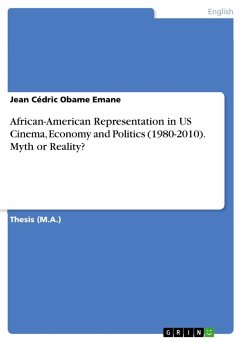Thesis (M.A.) from the year 2010 in the subject American Studies - Culture and Applied Geography, grade: 15/20, Omar Bongo University, course: Rédaction du Mémoire de Maîtrise, language: English, abstract: Whether we are in cinema, economy or politics, there is a great debate concerning the issues of representation in the United States. In fact, it is a permanent debate drawing the attention of people, as it is difficult to assert if a group is well represented. So the question of representation has already and always been debated by university professors and specialists of the issue, and continues to be debated. But some questions are worth asking: at which level can we talk about representation? Or when can we say that a group is actually represented? These questions lead us to deal with minority representation. Here we want to consider the notion of visibility and invisibility. In the United States there is what we term visible minority and invisible minority. Representation here is not about telling how many African Americans have succeeded in various fields. It is not about the number of Blacks who succeeded in cinema, economy or politics. The issue of representation goes beyond that perception. Of course, it does not imply that the quantity of Blacks advancing socially cannot be taken into account. But the point is that if we look at this, we shall notice that their representation is not that visible. For this reason we find useful to transcend that perception of representation. Our paper focuses on representation as the fact of being visible in the mainstreams. For instance, concerning minority visibility, can we say that Hispanics and African Americans have the same representation? We do not think so. This is why the notion of visible and invisible minority has to be considered. Representation here is more related to merit. Take for example, the case of the business world, do we know an icon among Hispanics whose visibility is worldwide? Certainly not! However, we have Oprah Winfrey whose fame has reached worldwide as the only Black billionaire. Take also politics with President Obama. And finally, consider American cinema, can we speak about Hispanic or Chinese cinema in the United States today? Certainly not! Yet, we can speak about African American cinema, because it is visible. That is what we have termed as minority visibility.
Hinweis: Dieser Artikel kann nur an eine deutsche Lieferadresse ausgeliefert werden.
Hinweis: Dieser Artikel kann nur an eine deutsche Lieferadresse ausgeliefert werden.








